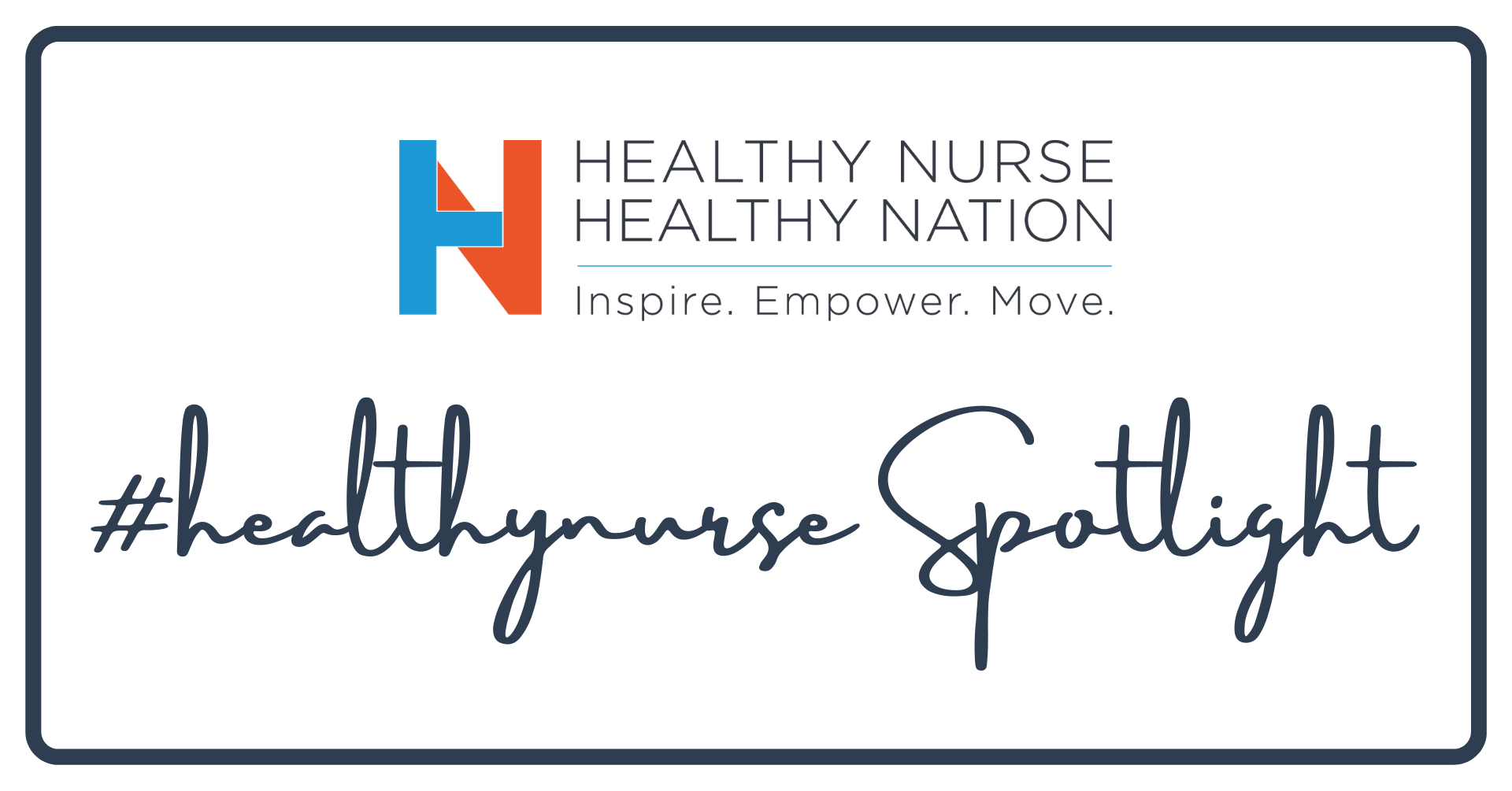Healthy Nurse, Healthy Nation™ - #healthynurse Spotlight Series - Maria Scholz, MSN, RN, CGRN
Published
Nurse tackles incivility in nursing
 A nursing degree prepares you to help people in many ways and settings — the career path possibilities are endless. But when #healthynurse Maria Scholz, MSN, RN, CGRN, started nursing, she didn’t realize her path and her passion would center around helping nurses themselves.
A nursing degree prepares you to help people in many ways and settings — the career path possibilities are endless. But when #healthynurse Maria Scholz, MSN, RN, CGRN, started nursing, she didn’t realize her path and her passion would center around helping nurses themselves.Maria has always been interested in the nursing work environment. But she’s most passionate about fixing the toxic environment that can stem from nurses being uncivil (unpleasant) toward each other.
“There is a saying that nurses eat their young,” Maria says. “It comes from that culture in nursing where we think that incivility is acceptable; and it’s not. But because it’s been in the nursing profession culture for decades or more, it’s complex and difficult to tackle.”
What Is Incivility in Nursing?
Incivility is rude or disrespectful words or actions that may or may not have intent behind them. But it’s more than being impolite. Like bullying, incivility in nursing is a form of workplace violence. While bullying typically involves the intent to target a single person, incivility is an ongoing display of rudeness or hostility that leaves coworkers feeling humiliated, isolated, fearful, and anxious. As a result, it can impact their mental and physical health.
Being treated with hostility is often accepted as a “rite of passage” or “trial by fire” for new nurses. But it’s not limited to that group — it permeates nursing schools and affects nurses of all ages and types. And it doesn’t just end with hurt feelings. An environment of incivility can affect the team’s communication, cause nurses to make clinical errors, and ultimately impact patient care.
Types of incivility found in nursing include:
- Verbal abuse, including hostile criticism, name-calling, disrespect, shouting, overtly scolding, humiliation, and threats
- Nonverbal abuse, such as scowling, eye-rolling, invading privacy, and a refusal to communicate
- Passive aggressive behaviors, including sabotage (setting someone up to fail), excluding someone from workplace conversations, and a lack of support
- Sexual harassment in the form of inappropriate behavior, offensive jokes or language, or unwanted sexual advances.
Recognizing a Need for Change
While she was working towards her master’s degree in nursing administration, Maria found herself digging into nurses’ work environments to identify successes and challenges. The information she learned about incivility and ANA’s 2015 Position Statement on Incivility, Bullying, and Workplace Violence were eye-opening.
“I couldn’t believe I had been a nurse for 20 years and never heard uncivil behavior defined as a type of workplace violence,” Maria says. “But incivility wasn’t new to me. Looking back, I have witnessed and probably participated in it — giving a nurse an assignment based on how I liked them or interacted with them. And one of my nursing instructors bullied me, even slapped my hand as I was trying to give an injection.”
A January 2022 survey by the American Nurses Foundation found that 66% of the 12,000+ nurses surveyed have experienced bullying and incivility at work. Almost 30% of that group reported uncivil behavior from administrators, managers, physicians, and staff nurses. Incivility is noticeably impacting new nurses. Up to 57% of new nurses have experienced negative behaviors leading to depression, anxiety, or work leave.
“A large percentage of new nurses leave their job within the first 6 months due to uncivil and bullying behaviors,” Maria says. “It’s a huge cost to the hospital and increases staffing issues, which are already challenging after the pandemic. If we don’t do something to address how nurses treat one another, this problem will just get worse.”
Embracing Advocacy
Maria volunteers her time advocating for the emotional safety of nurses. She recently joined the policy committee with ANA Massachusetts and spends her spare time networking, making connections, and gathering support from organizations like the ANA.
In 2022, the Joint Commission implemented new standards for workplace violence — a big step in the right direction. Maria is advocating to modify those standards to include targeted language specific to incivility. That way, when hospital organizations apply for recertification every 2 years, they must collect data about incivility and meet specific standards.
Supervisors and leaders set the tone of the culture. “If they enable this culture of incivility and don’t do things to help mitigate it, it trickles down,” Maria says. “If nurses don’t feel psychologically safe, they won’t report these incidents because they don’t think they will be heard.”
What Nurses Can Do
Until those workplace standards are in place, you can improve the culture of incivility where you work by stopping it in its tracks. Raising awareness of incivility as workplace violence is the first step.
“Often, the offending nurse doesn’t realize what she’s doing,” Maria says. “But nurses who witness it and don’t do anything are enablers of the behavior and part of the problem.”
It’s not always easy to say something when you see something or to admit that you may be part of the issue. You may feel like you can’t report an incident of incivility due to:
- Belief that there is no support from upper management
- Fear of reporting harassment conducted by a supervisor
- Feeling that incivility is an accepted part of the workplace culture
- Unawareness of a reporting system for incivility
If you can push through those barriers, taking action can create change where you work:
Advocate for Yourself and Others
If you witness or experience an uncivil act, address it in the moment whenever possible. The Oncology Nursing Society recommends following the DESC (Describe, Express, Specify, Consequences) model:
- Describe the situation using one or two factual sentences (no feelings or opinions)
- Express how the action made you feel using “I” statements
- Specify what you’d like from the person and how you’d wished they acted in that situation
- State the consequences you’d like to see and why it’s important to you
Then, always write an incident report to make your manager aware of the situation. “Even if you don’t feel comfortable or safe addressing it in person, write that incident report,” Maria says. “That way, you bring it to the manager’s attention, and it is documented.”
Reflect on Your Own Actions
Nurses who aren’t civil toward their coworkers may not be aware of how their actions affect others. In some cases, incivility may stem from implicit bias — the unconscious feelings and attitudes toward individuals based on personal characteristics such as age, race, gender, or ethnicity. Reflecting on your behavior at work may shed light on whether you are contributing to the problem.
“The best thing you can do as a nurse is advocate for your coworkers and yourself,” Maria says. “Take control of your environment and raise the issue. When we take care of ourselves and each other, we can provide the best possible care to the patients who need us.”
Maria Scholz, RN, MSN, CGRN, spent 21 years working at the bedside as a clinical nurse before becoming a principle medical safety specialist at Boston Scientific. She is also working toward her DNP in health policy at The George Washington University.
Are you a #healthynurse? Share your stories with us in our discussion.

Not a member of Healthy Nurse, Healthy Nation (HNHN) yet? Join today!
Sign up for our monthly challenges!
Blog #healthynurse Spotlight
06/21/2023 11:09am CDT
The #healthynurse Spotlight is a shout out to nurses who are making changes in their lives to improve their health and wellness. You can too! Read their stories for inspiration here.




Post a Comment or Question
This post is amazing and provided so much information about a crucial topic in nursing, that we often avoid. I will share this with my coworkers. I am a strong believer that nursing is in deperate need of positive dynamics to end a cycle of lateral violence and incivility. The nursing profession needs to evolve to create an inclusive environment that is based in mutual support and care for one another.